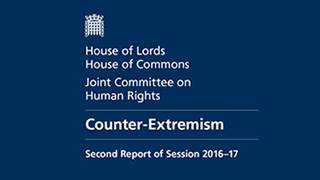Committee calls for review of 'counter-extremism strategy' in damaging report

A committee of MPs and peers has called for an independent review of the government's 'counter-extremism strategy' in a damaging report, released today.
The Joint Committee on Human Rights has warned that the current proposals appear to be "based on questionable assumptions," risk bringing law-abiding citizens under scrutiny, and could "take us into the dangerous area of 'thought-policing.'"
"The government has not yet demonstrated a need for new legislation", the committee's report said, as all possible offences appear to fall under existing law.
Unworkable
In a report, the Committee urged the government to "tread with great care" with its much delayed 'counter-extremism and safeguarding bill', or risk "making the situation worse, not better."
A new version of the bill was announced in the Queen's Speech in May aims to combat extremism, which is defined as "the vocal or active opposition to our fundamental values, including democracy, the rule of law, individual liberty and the mutual respect and tolerance of different faiths and beliefs," in all of its forms.
The report highlights the bill has yet to sufficiently define its core issues of "non-violent extremism" and "British values". It added that the current "degree of confusion" in the government's definition is likely to prove "unworkable" in law.
'Dangerously vague'
The government has faced criticism for the strategy's lack of definitions.
Christian Concern's CEO, Andrea Williams, said: "The definition of extremism, and especially 'non-violent extremism', remains dangerously vague and open-ended... It casts the net far too wide.
Labour MP Harriet Harman, who chairs the committee said: "providing a clear definition of extremism is a difficult task and the government has yet to succeed in doing it."
She pointed out that the current definitions are so wide, she too would be included as being extremist, for being intolerant of those who disagree with homosexual lifestyles.
Speaking to BBC Radio 4's Today Programme, today, she repeated those concerns, telling listeners that the government had previously said extremism includes "intolerance or not respecting the religious views or beliefs of others".
"But the difficulty with that is - again it's the definition - for example, I don't respect religions that regard women as subservient, I don't tolerate the views or beliefs of people who think that homosexuality is a sin, but I'm clearly not an extremist on the path to violence.
"To have draconian orders - breach of which is a criminal offence - without being able to describe the problem that you're trying to put these orders against, is a problem."
'Violent Jihadism'
The Committee question the assumption that there is a correlation between conservative values and support for violent jihadism, saying that a link is "by no means proven".
Stressing the need to have a clear distinction between extremism and 'religious conservatism', the report states that the 'counter-extremism strategy' assumes "there is an escalator that starts with religious conservatism and ends with support for jihadism; and that combating religious conservatism is therefore the starting point in the quest to tackle violence."
It adds: "However, it is by no means proven or agreed that religious conservatism, in itself, correlates with support for violent jihadism.
"The aim should be to tackle extremism that leads to violence, not suppress views with which the Government disagrees".
An overly broad law may could see Christians and other groups targeted. In 2015, for example, Nicky Morgan, who was the Education Secretary at the time, suggested that children who express negative attitudes toward homosexual lifestyles could be potential "extremists".
The report highlights comments David Anderson QC made in 2014, in his review of the Terrorism Act 2014 he said: "If it becomes a function of the state to identify which individuals are engaged in, or exposed to, a broad range of 'extremist activity', it will become legitimate for the state to scrutinise (and the citizen to inform upon) the exercise of core democratic freedoms by large numbers of law abiding people."
Related Links:
Harriet Harman MP speaks to BBC Radio 4's Today Programme about the 'counter-extremism'
Homosexuality comments could be sign of extremism, says Education Secretary
Government's 'counter-extremism is 'flawed'
MPs and peers demand review of Prevent duty (Schools Week)
Counter-Extremism: Second Report of Session 2016–17 (Parliament)
